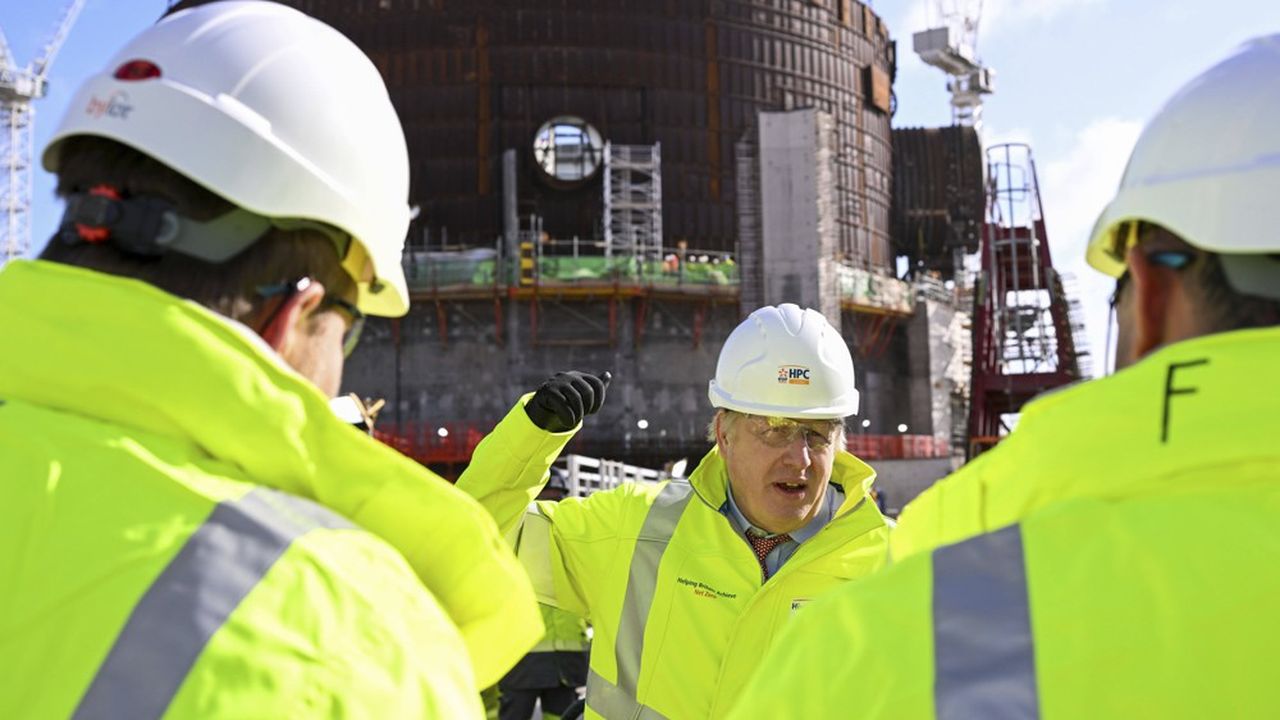Black streak continues for EDF in UK The French Energy Group announced Thursday evening that the construction site for two new generation nuclear reactors (EPR) at Hinkley Point in Somerset (southwest England) will be delayed by another year. And at least £3 billion in additional costs.
“The start of electricity production for Unit 1 is now scheduled for June 2027. In the absence of a new epidemic in Ukraine and an additional effect, the risk of postponing the supply of the two units is estimated at 15 months,” the group said in a statement. Initially, the launch was planned for the end of 2025, and it was Already postponed Last year, till June 2026.
The next milestone is the installation of the dome at Unit 1 of the plant in the second quarter of 2023, compared to the earlier end of 2022.
Two years of covid spending
EDF now estimates the cost of the project at “between 25 and 26 billion pounds sterling” in 2015, against 18 billion in 2016, when the British government gave the green light and the start of construction. Originally controversial and contested by French unions over its cost, the project has already been revalued at between £22 and £23 billion.
The new delay announced has been put on account of the two-year pandemic. “People, resources and the supply chain are stretched and their efficiency is limited. In addition, the volume of courses and civil engineering works and the cost of these works and especially maritime works have increased,” explains the group.
Britain’s nuclear strategy
Hinckley Point C is the only nuclear power station to be built in the UK. EDF is the project owner, while its Chinese partner CGN owns a third of the project. It is adjacent to the Hinckley Point B nuclear power station, which was commissioned in 1976 and which EDF plans to close by July 2022.
The Channel-wide ambition is to maintain nuclear’s share of the energy mix at 20% to achieve carbon neutrality by 2050 – there are currently 15 reactors across 8 sites in the UK. London wants to produce 95% low-carbon electricity by 2030.
Three EPRs were completed but not without conflicts
The EPR (European Pressure Reactor) is a model of nuclear reactor that is designed to be more powerful and safer than previous generations. Three have been completed in Finland and China, and three are under construction, one in France and two at Hinkley Point. But it is not only the latter who face major setbacks.
Finnish reactor (Olkiluto-3) It started in March But with a delay of 12 years, and one of the two Chinese EPRs implemented in 2018 and 2019 is closed from July 2021. Technical issues . As for the French reactor, In Flamanville, cumulative delays reach 11 years Fuel loading is now scheduled for the second quarter of 2023, with costs rising to 12.7 billion euros, according to EDF’s estimate on January 12, 2022. In 2006, this very powerful 1,650 MW reactor was announced for 3.3 billion euros.
Recapitalization and Erosion
For EDF, the Hinckley Point delay and extra cost are yet more bad news, adding to the pile-up since the start of the year. The group had to be recapitalized in April, and its profits will fall sharply this year because the French government asked it to sell more electricity at lower prices — a move the CEO publicly opposes.
In addition to the delays in the French and English EPRs, the team also had to resolve a problem Tube erosion It was forced to shut down 12 of its 56 French reactors. In total, more than half of the furnaces in France exist today Down for maintenance .
EPR at the heart of French strategy
However, in France, EPR technology is at the heart of the energy strategy. President Emmanuel Macron has announced his intention to restart the nuclear power program with six new generation EPR2 reactors, particularly praising the climate benefit of the electricity thus produced.
This long-term plan will not be completed in five years. First commissioning is not expected before 2035 or 2037. But the financial stakes are immediate and substantial, with six reactors estimated to cost more than €50 billion.
With AFP

“Beeraholic. Friend of animals everywhere. Evil web scholar. Zombie maven.”







More Stories
What are the 5 most spoken languages in the world?
Master the Art of Applying Acrylic Nails at Home: A Complete Guide
Tortoises as Family Pets: Teaching Responsibility and Care